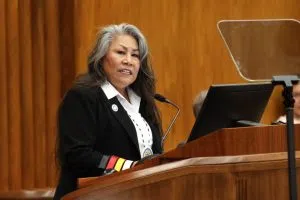
Standing Rock Sioux Tribe Chair Janet Alkire delivers the Tribal-State Relationship address during a joint session of the Legislature on Jan. 7, 2025. (Michael Achterling/North Dakota Monitor)
(Mary Steurer – North Dakota Monitor) – Tribes, the state and federal government must continue to work together for the benefit of their people, Janet Alkire, chair of the Standing Rock Sioux Tribe, said in a Tuesday address to state lawmakers.
“Our common citizens are our bridge, and without the valuable support they need, that infrastructure will collapse,” Alkire said.
In her speech, Alkire provided the Legislature with updates on the five Native nations that share geography with North Dakota: Standing Rock, the Spirit Lake Nation, the Mandan, Hidatsa and Arikara Nation, the Turtle Mountain Band of Chippewa and the Sisseton-Wahpeton Oyate.
The need for more infrastructure on reservations was a common refrain in Alkire’s speech.
In recent years, North Dakota tribes have benefited from federal legislation like the American Rescue Plan Act and other funding to support developments as wide ranging as new housing, medical facilities and energy projects, she said.
For instance, the U.S. Department of Transportation has awarded a $14.5 million planning grant for a proposed bridge over the Missouri River connecting the reservation to Emmons County.
But it’s not enough, Alkire said. She called on lawmakers, tribal chairs and federal leaders to continue investing in infrastructure in the interest of future generations.
“A bridge to the future needs infrastructure,” she said.
Alkire also highlighted health care, education and economic development as key priorities for the tribes.
She urged the Legislature to pass a bill this session to fund research into how much the tribes contribute to North Dakota’s gross domestic product.
Mark Fox, chairman of the Mandan, Hidatsa and Arikara Nation, said he brought that proposal to Alkire. He said the state had previously commissioned a similar study in the early 2000s.
Fox added that the state and tribes shouldn’t see each other as economic competitors, but as collaborators.
“We need to be partnering in all the things that we do,” he said in an interview after the address.
Rep. Lisa Finley-DeVille, D-Mandaree, and Rep. Collette Brown, D-Warwick, agreed that improving the working relationship betweens the state and tribes should be a priority for the upcoming biennium.









